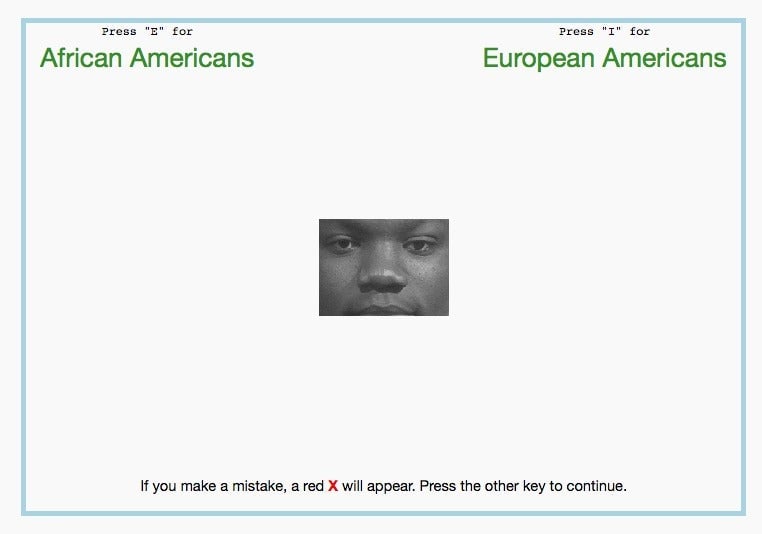“Implicit bias” tests help people feel morally superior, even when their results show bias
The concept of “implicit bias” is a staple of workplace diversity trainings and conversations about systemic racism. Largely that’s because two decades ago, psychologists created the Implicit Association Test (IAT), which they claimed effectively measures unconscious prejudice even among those who claim to be consciously egalitarian.


The concept of “implicit bias” is a staple of workplace diversity trainings and conversations about systemic racism. Largely that’s because two decades ago, psychologists created the Implicit Association Test (IAT), which they claimed effectively measures unconscious prejudice even among those who claim to be consciously egalitarian.
Though unconscious biases almost certainly exist, the science behind this particular test is weak, and relying on the concept as a way to reduce discrimination has produced few tangible results. Nevertheless it remains popular: A paper on public perception of the IAT, published in British Journal of Social Psychology last month, estimated that 70 online news articles referenced the test in 2015-16 alone. The authors, led by Jeffrey Yen, social psychology professor at the University of Guelph in Ontario, Canada, analyzed public response to discussion of the IAT through a thorough reading of comments under New York Times articles that mention IAT from 2008 to 2010.
There was a spike in IAT interest in that time, note the authors, as political commentators wondered whether implicit bias would prevent then-candidate Barack Obama from getting enough votes to win the presidential election. “Once Obama was elected, however, the concept of implicit bias and the ‘real-world’ validity of the IAT were called into question in public discourse,” they add.
There were 11 New York Times articles on the IAT during that period, seven of which allowed reader comments. The authors analyzed the 793 comments under these article to study the themes that emerged; they did not count the number of comments that fell within each theme, but instead focused on the “intensity and quality of discussion within them.”
Comments broadly fell into two categories: Those who accepted IAT findings, and those who were skeptical of them. Among those who believed in the validity of the IAT, several posted “confessions” based on their own results. For example:
For the record, I took this test a while ago and I have a slight anti-black bias…. Although I think of myself as passionately egalitarian, I’m happy to own my implicit biases and glad to be made conscious of them. Someday I hope to be able to take the same test and see how my brain feels about men and women.
This comment, and others similar, are “performative of a morally correct identity,” write the study authors. Separately, they highlight how the commentator distances herself from her results: she admits bias, but seems to hold her brain responsible, as though it were separate from herself.
Another trend among comments made by readers who embrace the IAT was to call on those who doubt it to better examine their own psyches. These “sanctimonious injunctions,” as the authors describe them, tend to charge critics of the IAT with being guilty of not addressing their own prejudice. For example, one commenter wrote:
Critics need to decide exactly what they are mad about – I understand how cultural defensiveness can make one throw a hissy-fit in response to being called a bigot.
The study authors suggest that simply reading about or discussing the IAT can make people feel morally superior. “The acknowledgement of implicit bias can be a way of presenting oneself as being not prejudiced, and as tolerant and open-minded,” they write.
Meanwhile, comments expressing skepticism about the IAT implied that the academic research behind it was itself biased, or that the test is superficial and does not show how to address widespread racism. For example:
To me the question of whether [unconscious] racism exists is almost irrelevant when 1 in 15 black adults and 1 in 9 black men between 20 and 34 is in jail.
Or:
I was smugly satisfied with my results: no racial … bias. [But] how can I, having spoken with less than 10 African people in my life, state confidently that I have no bias? … It was an entertaining little study, but I for one don’t feel those 10-minute tests pried my mouth open, peered down my throat and asked, “Is there a soul in there?”
In other cases, commenters used self-mockery in an apparent demonstration of a belief that there’s not much meaning to be drawn from the test:
I’m a white male in his mid-30s, yet I’m good. Even subconsciously! Yes!!
And:
I just took the online test you suggested, and my analysis was that I have a slight preference for black people. I guess that makes me your garden-variety guilty white liberal?
The scientists who created the IAT have said recognizing unconscious racism is key to combating the systemic prejudice that pervades society, while critics of the test argue that blaming discriminatory behavior on unconscious impulses allows people to evade responsibility for their actions. The analysis of New York Times comments shows it’s probably more complicated than the way either side articulates their position.
Some people use the IAT as an opportunity to examine their own thoughts and assumptions. Others take their test results as an indication that they’re morally superior to those that haven’t taken the test (or don’t believe in its validity). Just as reactions to the concept of implicit bias are mixed, there’s no one definitive consequences from conversations that focus on the IAT: It will likely make some more vigilant about their potentially discriminatory behavior, while others will become more complacent. At the very least, though, the test has encouraged further conversations about race, even if it can’t solve racism.